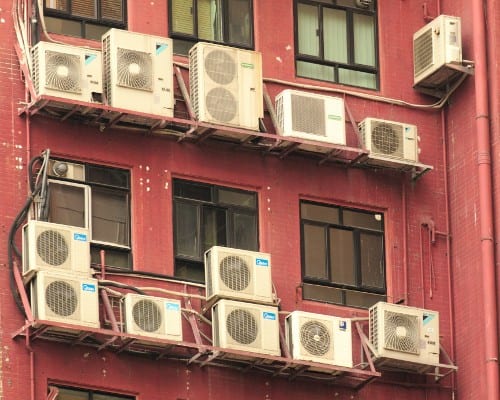Each household has different cooling needs during the hot summer months. Because of this, there are several different types of air conditioners and cooling units available on the market, each built to tailor to a home’s specific requirements.
Single-stage and two-stage air conditioners are just two of the many types of HVAC solutions available for purchase. When it comes to the different ways AC units work, many homeowners don’t know, for example, how a two stage AC vs single stage unit will function in their home.
To help out, we’ve put together this guide to explain what single and two-stage heating is, how each function and each type’s unique differences.
If you’re interested or ready to upgrade your air conditioner, just contact us at River Valley Air Conditioning to schedule an appointment!
Single Stage Air Conditioning: What it is and how it works
When it comes to finding a new home HVAC system, many homeowners want their air conditioners to have simplified functions and operations.
When needed, the air conditioner simply runs “full force” to cool the air in your home. Then, when the set temperature’s been reached, the system turns off until the heat builds up again to activate the AC’s sensors. For many home and business owners, there’s only on and off.
Several AC units function this way. The technical term for this type of operation is called single-stage air conditioning or single-stage air conditioners. Referring to the number of “stages” the system runs at, these ACs are by far the most common and easy-to-find systems.
Like their furnace counterparts, single-stage air conditioners either run full speed and at full power when on or are simply turned off. Consequently, it is common to see this type of cooling system in most buildings–if not all.
What Is Two-Stage Air Conditioning?
Understanding two-stage cooling becomes a bit easier once you know what single-stage cooling is. If single-stage cooling is simply full power or off, two-stage cooling is similar but with an added feature or “stage”.
Two-stage cooling has two settings or stages. One is for those incredibly hot days and the other is ideal for cooler but still uncomfortably warm days. When making a comparison between single-stage vs two-stage ACs, the two both have a stage where the cooling runs full blast. But, the main difference is a two-stage air conditioner’s second stage.
This second stage is essentially a function that lets the unit run at half power or half efficiency.
When the setting switches to the second stage, the AC unit will still work, but it will use less power to cool the environment. In some two-stage systems, the first stage cools the air in the house quickly, and then the second stage takes over to maintain the temperature.
More Differences Between Two Stage AC vs Single Stage Air Conditioning
Of course, there are many more differences between a single-stage vs two-stage AC than just how they run. While that is often the main thing to consider when choosing a system, it’s also important to consider some of these other factors as well. Since every building has different cooling capacities and every household will have different preferences, it’s only natural that each home has its own considerations for which type of AC unit to install.
Consider those first when looking into whether or not a single-stage or two-stage air conditioner is best for your home.
Energy use and efficiency
One of the many factors that separate the two kinds in comparison of a two stage AC vs single stage air conditioner is their respective energy use and efficiencies.
Single-stage units
As mentioned, single-stage air conditioners have a single “stage” or running function, often referred to as a fixed capacity. This typically means that whenever the system is turned on, it runs and works at full power until the temperature reaches what the thermostat is set at.
However, even when the cooling demand is much lower, single-stage ACs use the same power than they would when the demand is higher, ultimately using much more power. On the other hand, two-stage air conditioners offer increased energy efficiency due to their multiple operational settings.
Two-stage units
Two-stage ACs are able to reach and maintain the same desired temperature without the frequent on-off cycling of a single-stage AC, all because of the ability to switch to a slower speed setting in the second stage.
Thanks to it, the system uses far less energy, and your energy bills drop with it. Due to their greater flexibility and overall efficiency, two-stage air conditioners are often far more effective because they can adjust their cooling output depending on the surrounding temperatures and other possible needs.
Initial Cost and Maintenance Costs
When considering comparisons between a single stage vs two stage AC, cost is another aspect that should be taken into account. When considering cost, both initial and maintenance costs should be considered.
Single-stage AC models usually have much lower costs for both purchase and maintenance. Single-stage air conditioners also tend to have less complex designs and fewer intricate controls, contributing to their lower purchase and upkeep costs.
Conversely, two-stage AC units have an enhanced capacity and more internal components as a result. Due to the increased complexity, they often come at a higher cost to install and maintain. However, in the long run, a two-stage system may be cheaper to run in your home.
Trying to decide which system to choose? Contact an AC pro.
When deciding between a single-stage and a two-stage air conditioner, it depends on your specific home needs and your personal preference. Multi-stage systems provide better climate control for increased comfort and energy efficiency. Single-stage systems are much easier to use and cheaper to own.
If you need help deciding which system is right for your home, contact the experts at River Valley Air Conditioning. We have decades of experience in providing our community with the best HVAC services in the Tri-State area.
If you need more information to help make a choice, contact our team at River Valley Air Conditioning to schedule an appointment.

